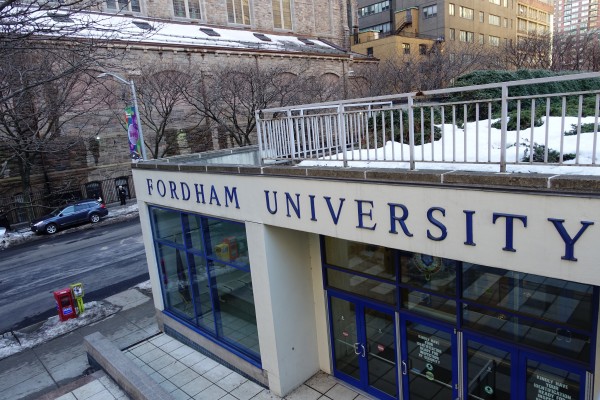Fordham Needs a Scholarship for Undocumented Students and Refugees
September 16, 2016
Fordham University is a school that takes pride in its Jesuit values. In its mission statement, Fordham asserts that it is “committed to research and education that assists in the alleviation of poverty, the promotion of justice, the protection of human rights and respect for the environment.” Clearly, the University acknowledges that education is a critical component in the promotion of social justice. As an exercise of these important values, Fordham should develop a scholarship for admitted applicants who are undocumented students or refugees. The reason is very simple: these two demographics find it substantially more difficult to finance a college education.
At a time when the cost of higher education continues to soar, prestigious universities, such as Fordham, become increasingly out of reach for both of these groups. While some states, like New York, offer in-state tuition to non-US citizens at public colleges and universities, undocumented students are not permitted any federal or state educational grants and scholarships to help cover the costs of education. On the other hand, although many refugees and asylees are considered “eligible non-citizens” for federal student aid, they often face unique financial challenges that result from relocating to a new country.
Many of these individuals are high-achievers who will excel at colleges like Fordham.
As such, it is evermore important for universities to step up and assist these students in overcoming their obstacles. Many of these individuals are high-achievers who will excel at colleges like Fordham, and dreamers who, given the right education and resources, will make extraordinary accomplishments and carry forward Fordham’s mission and values. But the status quo means windows of opportunity are closing and an increasingly xenophobic political environment risks further marginalization of these individuals.
Fordham should actively welcome undocumented and refugee students, empower them to accomplish their goals through education and enable them to be men and women for others by setting up a scholarship that makes a Fordham education possible. This is a mission that many other Jesuit institutions have already embraced. For example, a research partnership between Santa Clara University, Loyola University Chicago and Fairfield University on the experiences of undocumented students found that their largest needs are financial. As a result, the schools collectively made recommendations that included the creation of a “common fund” to help meet the financial needs of undocumented students at Jesuit universities. Santa Clara University provides the Hurtado scholarship, which covers tuition, room and board, and a living stipend for undocumented students annually. Many non-Jesuit colleges offer similar scholarships for undocumented students and refugees as well, such as Harvard, Pomona and Columbia to name a few.
In contrast, Fordham does not have financial resources dedicated specifically for undocumented and refugee students in its restricted scholarships, nor does its website even include outside resources for applicants and admitted students.
It is not just goodwill that makes this scholarship important.
It is not just goodwill that makes this scholarship important. Including these students at Fordham is crucial to enriching the academic experience. How can we have meaningful discussions in the classroom about immigrant and refugee policy without including them in our conversation? How can we discuss ongoing refugee crises around the world without including perspectives of those who have been a part of them? A rich academic experience requires diversity of perspective and that cannot be achieved unless those from marginalized communities have a seat in the classroom.
I was born and raised in Chicago’s south side in a community of Mexican immigrants. My parents were undocumented for much of my childhood, as were many of my neighbors, friends and family members. I attended high school alongside many undocumented students, where classrooms were overcrowded and severely under-resourced; our books were as old as our teachers, and in a school of nearly 2,000 students, we had three armed police officers and over 10 security guards, but only one college counselor. Similar hardships prevail in inner cities where many undocumented and refugee families settle.
There are those who persevered through these struggles, but not all had the fortune of being U.S. citizens or having the financial resources to make ambitions of a great college education a reality. As a result, many settle for lower-quality education at local community colleges where opportunities are less abundant or become stuck in entry-level jobs.
Alternatively, a Fordham education can make the American Dream possible for these individuals. I know so because Fordham has made it possible for me, and countless others, to achieve what we never thought was possible. Fordham can change these individuals’ labels from immigrant or refugee into entrepreneur or scientist or academic. To exclude them from these possibilities because of their legal status and financial obstacles would be an injustice of the kind that Fordham teaches us to fight against.










Ben • Sep 16, 2016 at 7:27 pm
That’s absolutely preposterous. Why would they give a scholarship to an illegal immigrant and a refugee when students are struggling to pay their tuition already. This is completely ludicrous and I’m ashamed the writer has such a personal vendetta towards legal American students. I’m a Latino American myself. My family is first generation, my father immigrated to the US from Cuba and we filed all the paper work to become American citizens. If your objective is to encourage students whose family is breaking the law to gain acceptance into Fordham, then I will no longer contribute to the university. How about we make the American Dream a reality for American students. How about instead of encouraging illegal activity such as crossing the border “illegally” we inform prospective students that American students come first. I’m completely ashamed about this article and deeply concerned for the fate of this country.
Fordham Alumni
US Marine Corps Veteran